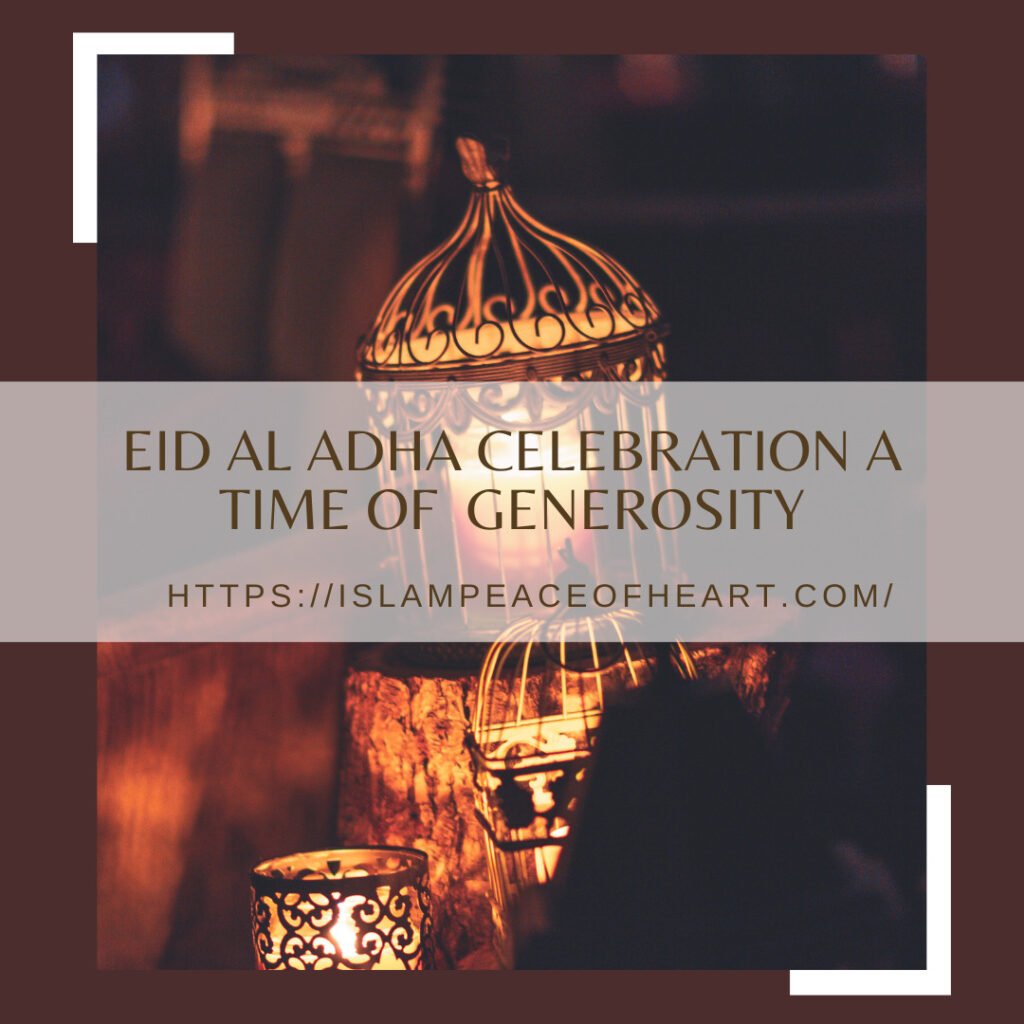Eid Al Adha Celebration: A Time of Joy, Faith, and Generosity
Introduction:
Eid al Adha, additionally referred to as the pageant of Sacrifice, is one of the most good-sized non-secular celebrations inside the Islamic calendar. This joyous occasion commemorates the willingness of Prophet Ibrahim (Abraham) to sacrifice his son as an act of obedience to God’s command. it’s miles a time of deep mirrored image, gratitude, and cohesion for Muslims around the arena.

Historical Significance:
Eid al Adha holds profound ancient and spiritual significance for Muslims. in step with the Islamic way of life, the competition commemorates the moment whilst Prophet Ibrahim, known for his unwavering religion and devotion, changed into tested through God. Ibrahim dreamt that he turned to sacrificing his cherished son, Ismail (Ishmael), as an illustration of his loyalty. As Ibrahim prepared to carry out the sacrifice, God intervened and provided a ram alternatively, symbolizing the closing act of mercy and divine intervention.
This episode is a testament to the significance of faith, acceptance as true, and submission to the need of God in Islam. Eid al-Adha serves as a reminder of Prophet Ibrahim’s unwavering obedience and the value of self-sacrifice for the sake of one’s faith.
Rituals And Traditions:
Eid al Adha is located with a selection of rituals and traditions that bring families, groups, and international locations collectively. The party starts with a special congregational prayer held at mosques, open areas, or exact prayer grounds. Muslims, dressed in their finest apparel, accumulate to offer prayers and pay attention to sermons that emphasize the importance of the pageant and its underlying messages.
Following the prayer, households partake in the ritual of animal sacrifice, known as Qurbani. This act symbolizes Prophet Ibrahim’s willingness to sacrifice his son and is an indication of devotion and gratitude in the direction of God. The beef from the sacrificed animal is then divided into three elements: one for the own family, one for spouse and children and pals, and one for the less fortunate. This act of sharing and generosity is relevant to the spirit of Eid al Adha.
Any other critical culture during this festive period is the exchange of gifts and greetings. families and pals come together, sharing love and affection, and imparting offers as an image of team spirit and goodwill. special food is organized, and delicious feasts are enjoyed, with an emphasis on inviting others to sign up for the birthday celebration, including the much less privileged.
The Spirit of Generosity:
Generosity lies in the coronary heart of Eid al Adha. Muslims are endorsed to increase their kindness and charity towards the ones in need, embracing the spirit of giving and compassion. it is common to witness acts of charity and philanthropy throughout this time, as Muslims donate money, meals, and garb to charities and folks that are much less fortunate.
Zakat al-Fitr, an obligatory charitable contribution, is also given earlier than the day of Eid. This form of giving helps purify one’s wealth and guarantees that the much less lucky can partake in the joy of the celebration. The spirit of generosity extends beyond financial donations, as acts of kindness, forgiveness, and reconciliation are also emphasized throughout Eid al-Adha.
Conclusion:
Eid al-Adha is a joyous occasion that brings collectively Muslims from all walks of existence, uniting them in religion, gratitude, and acts of kindness. The party serves as a reminder of the values of sacrifice, obedience, and acceptance as true within God’s plan, as exemplified by using Prophet Ibrahim. It encourages Muslims to reflect on their personal lives, exhibits compassion closer to others, and embody the spirit of generosity that lies at the center of this auspicious competition.
As the faithful collect in prayer, share meals, alternate items, and increase their fingers in charity, Eid al-Adha serves as a powerful reminder of the importance of the network, love, and the pursuit of a better cause. Through these collective acts of worship and benevolence, Eid al-Adha turns into a symbol of team spirit and a celebration of the bonds that join Muslims globally.
FAQs:
Q: whilst is Eid al-Adha celebrated?
A. Eid al-Adha is widely known as the 10th day of the Islamic month of Dhul Hijjah, following the yearly pilgrimage to Mecca referred to as Hajj.
Q: Are there any specific greetings for Eid al-Adha?
A. Sure, the commonplace greeting for Eid al-Adha is “Eid Mubarak,” which translates to “Blessed Eid” or “glad Eid.”
Q: Are non-Muslims allowed to participate in Eid al-Adha celebrations?
A. Eid al-Adha celebrations are regularly open to human beings of all faiths and backgrounds. it’s miles a great opportunity for non-Muslims to learn about Islamic traditions and foster interfaith understanding.
Q. Are there any recommended acts of worship throughout Eid al-Adha?
A. Other than the congregational prayer and the act of Qurbani, Muslims are recommended to interact in additional acts of worship, which include reciting the Quran, making supplications, and searching for forgiveness.
Q: How long does Eid al-Adha remain?
A. Eid al-Adha lasts for a period of three days, at some point at which Muslims interaction with various festive activities and spend time with their cherished ones.
